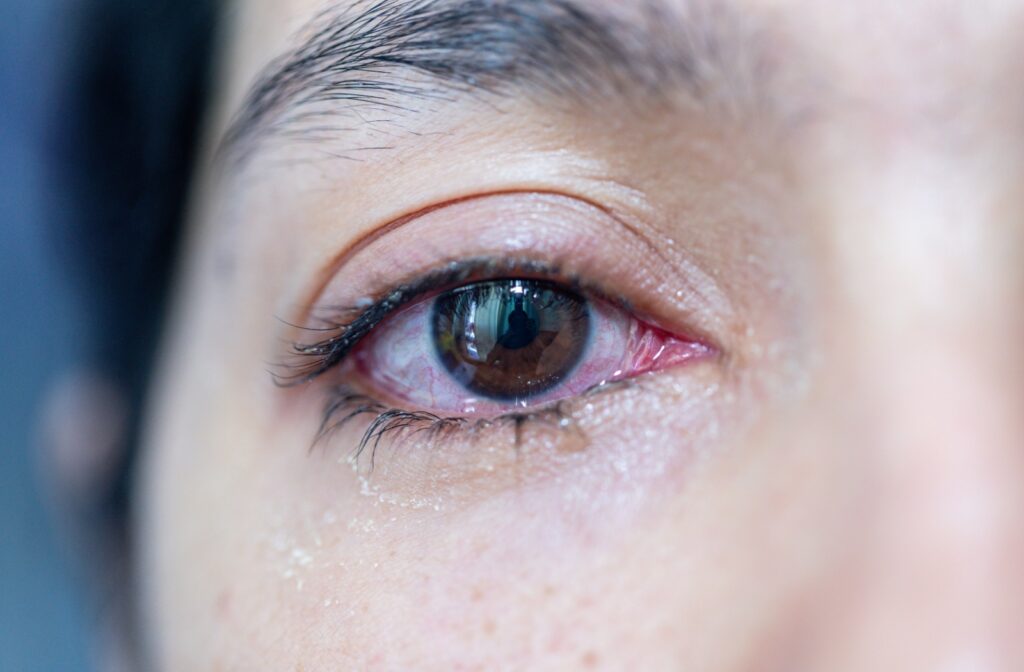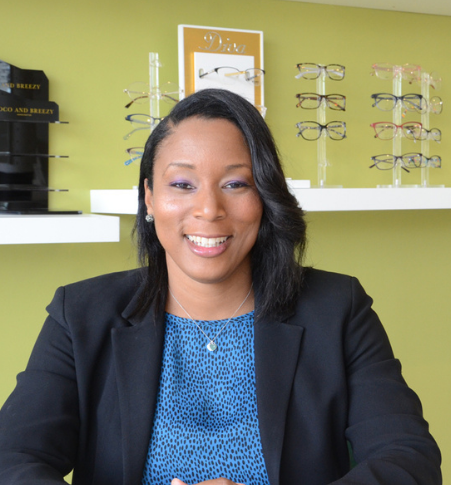Have you ever noticed your vision getting blurry after a long day of work or while reading a book? You might blink a few times to clear it up, only for the fuzziness to return. This common and frustrating experience can make you wonder if it’s time for a complete eye exam.
Dry eye can directly affect your vision, often causing temporary blurriness and other visual disturbances, but restoring moisture can help return your eyes to normal. At River City Vision Center, our dry eye therapy is specifically designed to address this common issue.
The Connection Between Dry Eye and Blurry Vision
To understand how dryness impacts sight, it helps to know a little about your tear film. This is the thin, wet layer that covers the front surface of your eye. It’s not just water: It’s a complex mixture of liquids that keep your eyes feeling smooth and comfortable.
Think of the tear film as a clear window. When it’s healthy, light passes through it perfectly, allowing your eye to focus for crisp, clear vision. When your eyes are dry, this “window” becomes patchy and uneven, scattering light and causing your vision to blur.
Visual Symptoms You May Notice
When dry eye disrupts your tear film, you may notice several vision-related issues that can appear and disappear throughout the day. Some of these visual signs include:
- Blurry vision that changes or clears with blinking
- Increased sensitivity to bright lights, both indoors and outside
- Eye fatigue or digital eye strain, which can feel like your eyes are tired and heavy
- Difficulty with seeing clearly at night, especially when driving
Light sensitivity happens because the uneven tear surface scatters light instead of focusing it as it usually does. This can create glare and make bright environments uncomfortable. The constant effort your eyes make to focus through a blurry surface can also lead to that tired, strained feeling.
Other Symptoms You May Notice
Beyond the impact on your vision, dry eye usually brings a set of physical symptoms. These are often the first clues that your eyes aren’t getting the moisture they need. You may be so used to these feelings that you don’t realize they’re connected to a treatable condition. Physical symptoms can include:
- A stinging or burning sensation, which can sometimes lead to discomfort and headaches
- A scratchy or gritty feeling, as if you have sand in your eye
- Redness and irritation
- Stringy mucus in or around the eyes
- Watery eyes, which is your body’s response to the irritation

It might seem strange that dry eye can also be watery. This happens when your eyes become so irritated that your brain signals for emergency tears to be made. Unfortunately, these reflex tears are mostly water and lack the lubricating qualities needed to soothe your eye’s surface.
Causes of Dry Eye
The reasons behind dry eye can change from person to person. They often fall into 2 main categories: Your environment and your body. Understanding these factors can help you and your optometrist determine which treatment may be most effective for you.
Your Environment and Daily Habits
Many parts of life can contribute to dry eye symptoms. Things like air conditioning, heating systems, and dry or windy climates can cause your tears to evaporate too quickly. Even sitting in front of a fan can dry out your eyes.
Our daily habits also play a huge role. When we focus on digital screens, we tend to blink much less often—sometimes up to 50% less. To combat this, we recommend the 20-20-20 rule to give your eyes a needed break. Blinking is your eye’s natural way of spreading the tear film, so when you don’t do it enough, your eyes can become dry and tired.
Age and Health Factors
As you get older, your body naturally produces fewer tears. This is a common reason people develop dry eye later in life, as age is a primary risk factor for changes in tear production. Hormonal changes associated with aging can also affect tear production and quality.
Certain health conditions can contribute to dryness, as can some medications like antihistamines (allergy medications) and decongestants (cold medicine). It’s helpful to be aware of these factors, as they can provide important clues about the source of your discomfort.
How an Optometrist Can Help with Dry Eye and Vision
If you’re dealing with inconsistent vision and uncomfortable eyes, you don’t have to figure it out on your own. An optometrist can take a close look at your eyes to determine the cause of your symptoms. We can create a personalized plan to help you find lasting comfort and clarity.
A Complete Eye Exam
A comprehensive eye exam involves more than just checking your prescription. We look at the complete health of your eyes, including your tear film. We have tools that allow us to assess both the quantity and the quality of your tears to see what might be causing the problem.
Improved Vision
Taking steps to manage dry eye can lead to clearer, more stable vision. By restoring balance to your tear film, the surface of the eye becomes smoother. This helps light focus correctly, which in turn can reduce blurriness and other visual symptoms. Your optometrist can discuss if this is a possibility for your specific case.
Management Options
Managing dry eye is not a one-size-fits-all process. An optometrist can guide you through the various approaches available and help you find what may work for you. Your plan may include a combination of options, such as:
- Over-the-counter or prescription eye drops to add moisture
- Simple changes to your daily routine, like taking screen breaks
- Other professional procedures to help your eyes produce or hold on to tears
Find Relief with Professional Guidance
You deserve to see clearly and comfortably. At River City Vision Center, our team is dedicated to listening to your concerns and helping you find solutions. If blurry vision and eye irritation are getting in your way, schedule a visit with our team in either Jacksonville or Orange Park today.





